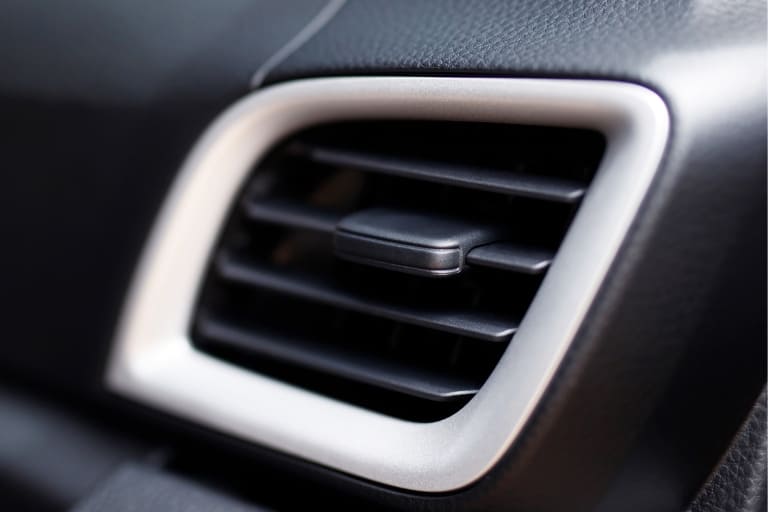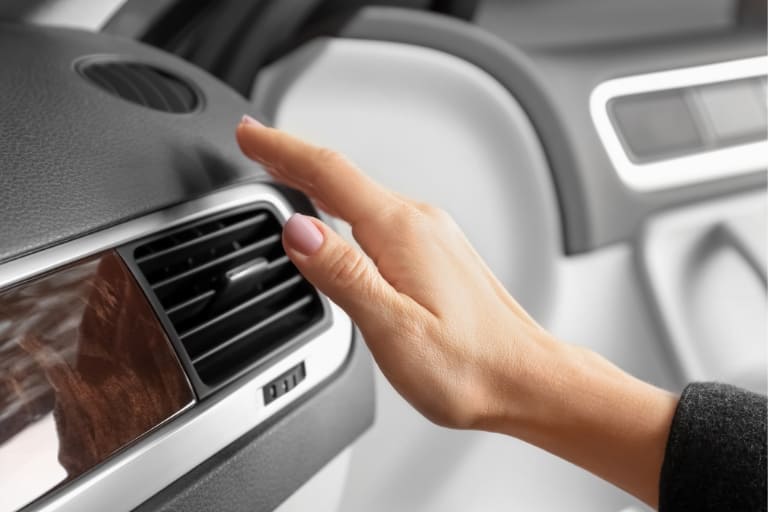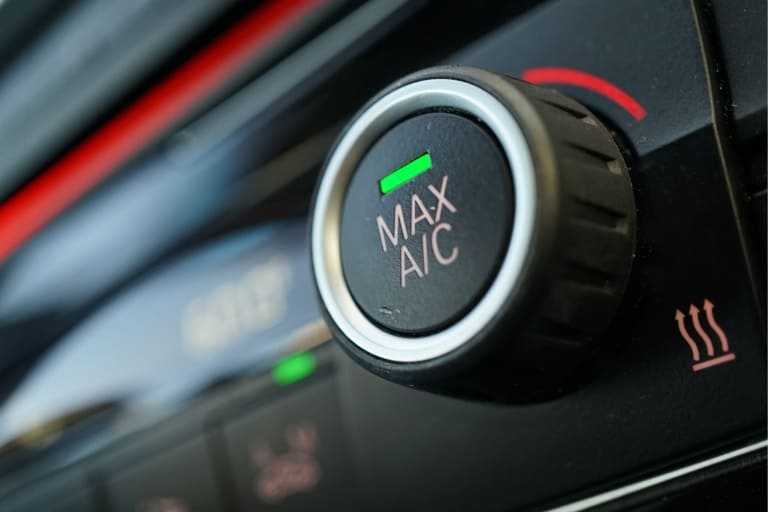Does running the AC in my car use gas? This is a question that many car owners have wondered about. The AC system requires power, which comes from the engine, which runs on gas. So, does running the AC actually waste gas?
In this article, we will explore the mechanics behind car AC systems and discuss whether they significantly impact fuel consumption. We will also answer some common questions about the relationship between AC and gas usage.
So, if you are curious about how your car’s AC affects your gas mileage, read on to learn more!”
Contents
- 1 How Does Car AC Work?
- 2 Does Car AC Use Gas?
- 3 How much gas does AC use?
- 4 Power Source for Car AC Systems
- 5 Fuel Efficiency and Car AC Usage
- 6 Gas vs. Electricity in Car AC Systems
- 7 Frequently Asked Questions
- 7.1 Does the automobile air conditioner run on gas or batteries?
- 7.2 Does the car’s air conditioning require gasoline or electricity?
- 7.3 Does turning off the air conditioning in your car save gasoline?
- 7.4 Does the car’s heater or air conditioning use more gas?
- 7.5 How much gas can you save without using the AC?
- 8 Conclusion
How Does Car AC Work?

The functioning of a car air conditioner employs a refrigerant that converts between liquid and gas states, thus resulting in a cooling effect. But the question that arises is does the car ac run on gas?
The answer is yes. but why does car ac use gas? The cars air conditioning system is powered by gas or gasoline. The second question that may arise in your mind is what gas car ac use. The car’s air conditioning system uses gasoline or petrol to get powered. In other cases, it can also use battery power or electricity to get powered.
The refrigerant compresses the compressor operated by a serpentine belt. Then the compressed refrigerant absorbs heat and humidity from the car. The refrigerant cools in the evaporator before being blown into the cabin or the car by outside air. The air conditioning system regulates the flow and content of the air to maintain the car at the proper temperature and moisture level.
You now have a rudimentary grasp of how an air conditioner works in a car and how car ac uses gas. So, to better know the concern “Does your car ac use gas?” let us first understand the components utilized in cars’ air conditioning. The car’s air conditioning system comprises various components that work together to chill and circulate air within the vehicle.
These elements are as follows:
Compressor: It is the heart of the air conditing system and is powered by the serpentine belt. It compresses the low-pressure gaseous refrigerant, which exits as a high-pressure gaseous refrigerant.
Condenser: A condenser is a tiny radiator-like device that is used after the compressor. It reduces the temperature of the high-pressure liquid refrigerant delivered by the compressor by forced convection produced by a radiator fan or a separate fan used in conjunction with the condenser.
Expansion valve: An expansion valve is a device that expands the high-pressure, low-temperature liquid refrigerant provided by the condenser to relieve pressure before transferring it to the evaporator for further processing.
Evaporator: The evaporator is where the refrigerant cools down before being pushed into the cabin by outside air.
Receiver: The receiver-dryer performs three critical functions:
- It temporarily stores refrigerant oil when it is not required
- It eliminates moisture from the refrigerant
- It filters out debris and impurities
Does Car AC Use Gas?
Yes. Using the air conditioner increases the engine’s load, impacting fuel consumption. Every item and feature in your vehicle requires electricity to function. When you drive a gas-powered automobile, the fuel provides the electricity. As a result, the air conditioning and other systems all run on gas.
How much gas does AC use?

The quantity of gas used by an air conditioner is determined by several factors, including:
- Your car’s size and age
- The vehicle’s speed
- Temperature
- Your driving style
According to American Automobile Association (AAA), an air conditioner consumes between 0.5 and 1 gallon of gas each hour of operation. However, the air conditioner may consume up to 1 gallon of fuel every 3 miles. When you drive your car, the gas mileage with standard AC will differ from the maximum AC.
The other possible reason could be the additional stress on the engine. An air-conditioning (a/c) system can increase fuel consumption by up to 20% if overloaded. The interior size of the vehicle, the outside temperature, and other factors determine the actual load.
The A/C may save up to 59% on gasoline at low car speeds. The relative difference in fuel usage (with and without A/C) diminishes as speed increases until becoming insignificant.
In the worst-case scenario, utilizing your car’s air conditioning can lower fuel economy by up to 25%.
Power Source for Car AC Systems
As there are so many car options available in the market you must be having many questions in your head like, does car ac use gas or battery? Or does car ac use gas or electricity because these days cars are electric?
The answer to all the questions is simple. Car Air conditioning (AC) systems can be powered by gas, electricity, or a battery. Each energy source has its advantages and downsides. Selecting one among them solely depends upon your requirements and priorities.
Gas-Powered Vehicles- Pumps and the alternator in gas-powered automobiles provide electrical power, which is subsequently used to operate the air conditioning system.
Advantages:
- Widely Available
- Ready to use
- Inexpensive
Disadvantages:
- Increase fuel consumption
- Reduce fuel efficiency
Electric-powered vehicles: Pumps and alternator in electric-powered automobiles directly uses electrical power, which is used to operate the air conditioning system.
Advantages:
- Clean and efficient fuel
- Reduces the greenhouse effect
Disadvantages:
- Range of model is limited
- Recharge time is more
Battery-powered vehicles: Pumps and the alternator in battery-powered automobiles uses battery power, which is used to operate the air conditioning system. These batteries are charged by a electric source.
Advantages:
- Clean and efficient fuel
- Reduces the greenhouse effect
Disadvantages:
- Range of model is limited
- Recharge time is more
Fuel Efficiency and Car AC Usage
| Annual distance driven using a/c | Annual increase in fuel consumption with a/c use | Fuel cost of a/c use over 10 years* | CO2 emissions from fuel used for a/c over 10 years** |
| 14,000 km | 140 L | $1,400 | 3,220 kg |
| 12,000 km | 120 L | $1,200 | 2,760 kg |
| 10,000 km | 100 L | $1,000 | 2,300 kg |
| 8,000 km | 80 L | $800 | 1,840 kg |
| 6,000 km | 60 L | $600 | 1,380 kg |
NOTE: *This table lists the estimated fuel costs and CO2 emissions associated with a/c use.*Based on a fuel price of $1.00/L of gasoline.
**Based on a CO2 emissions factor of 2.3 kg/L of gasoline
Source: Vehicle air conditioning (canada.ca)
Tips for optimizing fuel efficiency while using the car AC

Use the AC Sparingly:
To minimize the impact on fuel efficiency, use the AC only when necessary. If the weather permits, consider rolling down the windows or using the car’s natural ventilation system.
Pre-Cool the Car:
On hot days, if your car has been parked in the sun, the interior can become extremely hot. By rolling down the windows or opening the doors for a short period before starting the car, you can let out the hot air, making it more comfortable when you eventually turn on the AC. This allows the AC to cool the car more efficiently.
Set a Moderate Temperature:
Avoid setting the AC temperature to the extremes of low or high. Instead, choose a moderate temperature that will give comfort while putting less load on the AC system.
Utilize Recirculation Mode:
When the air conditioner is turned on, utilize the recirculation mode instead of drawing in outside air. This speeds up the cooling process by recirculating previously cooled air, lowering the burden on the AC system.
Park Wisely:
To lower interior warmth, park in shady places or use sunshades wherever feasible. This can shorten the time it takes for the air conditioner to cool the automobile, lowering total fuel use.
Regular Maintenance:
Maintain your car’s air conditioning system regularly. To ensure optimal airflow, clean or replace air filters and get the system evaluated for any leaks or faults that might affect its effectiveness.
Keep in mind that the actual impact on fuel efficiency will vary based on factors such as the make and model of the car, driving conditions, and individual driving habits. Using these strategies can help reduce the impact of air conditioning on fuel consumption and enhance overall fuel economy while keeping you comfortable in the car.
Gas vs. Electricity in Car AC Systems
| Aspect | Gas-Powered Car AC System | Electric-Powered Car AC System |
| Fuel Consumption | Higher fuel consumption due to engine load and increased drag. | Lower or zero fuel consumption as it uses electricity from the vehicle’s battery. |
| Environmental Impact | Contributes to greenhouse gas emissions and air pollution from burning gasoline. | Depends on the electricity generation source. The negative impact on the environment can be lower with renewable energy. |
| Availability | Widely available in conventional gas-powered vehicles. | Available in electric vehicles with built-in AC systems. |
| Energy Efficiency | Generally less energy-efficient due to losses in engine-to-compressor power transfer. | Electric motors used in EVs (Electric Vehicles) are highly efficient. |
| Direct Fuel Consumption | Requires direct consumption of gasoline from the vehicle’s fuel tank. | Does not directly consume gasoline; relies on electricity. |
| Indirect Fuel Consumption | Increases overall fuel consumption by adding load to the engine. | Utilizes electricity stored in the vehicle’s battery.Utilizes electricity stored in the vehicle’s battery. |
Now, let’s look at the increasing trend of electric vehicles and their influence on lowering gas use for air conditioning:
Reduced reliance on fuel:
Because the AC system is not powered by gas, electric vehicles (EVs), have an inherent advantage when utilizing it. This means that no gas is consumed directly, even when the air conditioner is turned on, minimizing total dependency on fossil fuels.
Running costs are lowered because:
EVs cost less than gas-powered automobiles on average. Lowering fuel usage while utilizing AC contributes significantly to this economic gain. As a result, EV owners can save money on gasoline throughout the course of the vehicle’s life.
Improved energy efficiency:
Electric air conditioners can be more energy efficient than gas-powered air conditioners. Electric motors in EVs are generally more efficient, enhancing cooling performance per unit of energy consumed.
Positive Environmental Impact:
Leased electric cars, particularly those fueled by renewable energy sources such as solar and wind, have the potential to cut greenhouse gas emissions drastically. Because the energy system achieves, a larger percentage of renewables, AC systems that run on electricity have a reduced overall environmental effect.
Frequently Asked Questions
Does the automobile air conditioner run on gas or batteries?
The answer to this query depends on the power source used by your vehicle. The air conditioning system in gas-powered automobiles requires gas, whereas batteries are used in battery-powered cars. The AC pump is powered by the engine in a gas-powered automobile and the batteries in a battery-powered car.
Does the car’s air conditioning require gasoline or electricity?
The answer to this question depends on your vehicle’s power supply. The air conditioning system in a gasoline-powered car requires gas, whereas an electric vehicle uses a battery. The AC pump is powered by the engine in a gasoline-driven car and the batteries in an electric vehicle.
Does turning off the air conditioning in your car save gasoline?
Shutting off the air conditioner can help you save money on gas. However, the quantity of gasoline saved fluctuates greatly depending on the circumstances. For example, because of the better wind resistance created by having the windows down, leaving the AC at toll road speeds can be more gasoline-green.
Does the car’s heater or air conditioning use more gas?
The air conditioning system often consumes more fuel than the heater. The heater takes advantage of pre-existing heated air from the engine. It does not need to generate warm air. Thus, no additional fuel is necessary. However, both systems require electricity to function. Thus, fuel is required to provide the power.
How much gas can you save without using the AC?
Yes, turning off the air conditioner can save gas. However, the quantity of gas saved varies tremendously depending on the conditions. According to some reports, turning off the AC will save you between 1 and 4 MPG, depending on the make and model of your automobile.
Conclusion
In conclusion, automotive air conditioning systems need gas or fuel. However, the amount of fuel consumed is tiny compared to other vehicle components.
The AC system is powered by the engine, which results in a modest increase in fuel consumption. However, advances in car technology have made air conditioning systems more effective over time, reducing their influence on fuel usage.
But it is crucial to note that factors such as driving conditions, outdoor temperature, and AC usage patterns can all have a significant impact on fuel consumption.
Drivers may improve fuel efficiency by operating the air conditioner sparingly, repairing the system on a regular basis, and ensuring sufficient insulation within the vehicle.
Also, Read:
- Car Air Conditioning Symbols Meaning
- Car AC Making Rattling Noise Explained
- Why Does Your Car AC Only Work When You’re Driving?
- Does Your Car AC Need Recharging?
- Car AC Hissing Noise
- Car AC Leaking Water: Causes, Fixes, and Prevention Tips
- Car Air Conditioner Compressor Repair Cost: A Complete Guide
- Why Does Your Car AC Smell Like Vinegar
- Car AC Suddenly Stopped Working
- Troubleshooting: Car Air Conditioner Not Working? Here’s What to Do
- Is Your Car AC Not as Cold?
- Does Car AC Use Gas? Fuel-Saving Strategies
